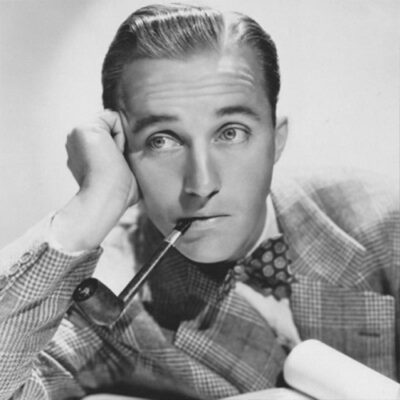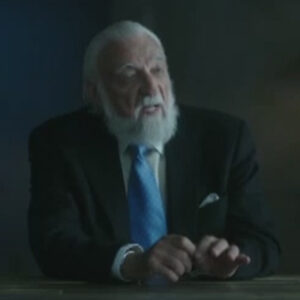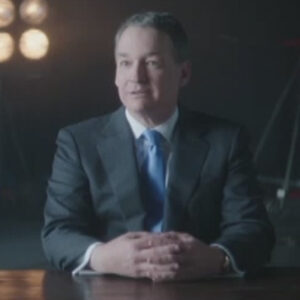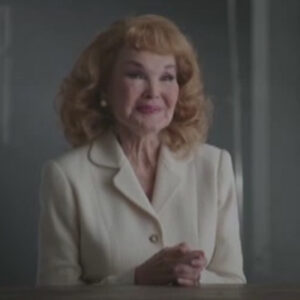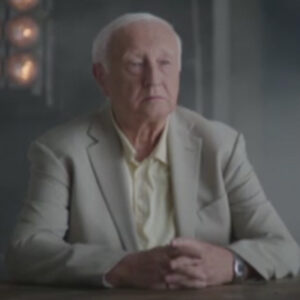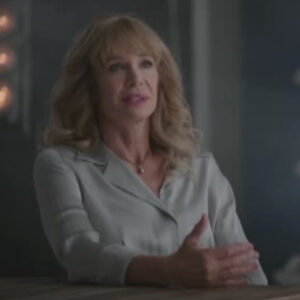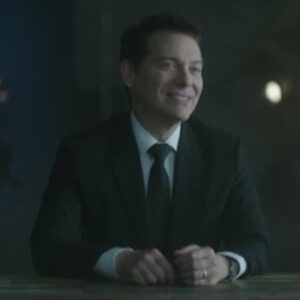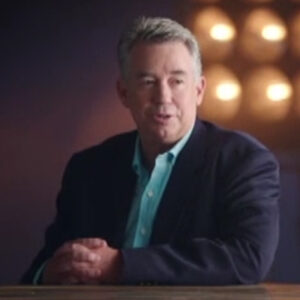Speaker Crosby, yeah, it was actually at a rehearsal read a read through of the script of the special. Merry Christmas, Fred, which was the one with Fred Astaire, and it was being in the family around a table at the producer’s offices. And I never met him before. And he was Bing Crosby. And there was there was no presents. Its he gave the impression that you’ve known him. You’ve known him your whole life was. It was. And I was looking forward to it because I’d never you know, I’ve been a fan since childhood, but I never I never actually met him, unlike a lot of other people in the business that I’d worked with. And he was completely receptive to writing while he was and I had written a lot of special material for that show and he loved it. I don’t think there were any objections. And I think there was a little nervous because he hadn’t done a variety television in a while. And and it was about the amount of time he had to learn it because it was pretty extensive and it was a lot of words.
Speaker So are you talking about songs or even dialogue? Well, both, but both side.
Speaker No, but there are ultimately more concurrent, I believe, but he seemed a little uncomfortable in the whole television medium because he hadn’t done it in a long time, but learning the material was a bit of a challenge. And that’s why I was able to I had to spend a lot of time with him. And then but when the two of them came together, it was like magic. It’s like they had worked together that, you know, a week before.
Speaker Did they ever discuss with you working on these guys? Probably. Pardon? Have they ever discussed working together on these guys quality?
Speaker And they didn’t talk about it. But, you know, in everyone’s memory, you can’t you you couldn’t erase the fact that you’d seen them and see them younger and but as affable and as comfortable as they were as performers, there was a synergy between the two of them remained the same all those years later.
Speaker I can’t remember their names. Oh, no.
Speaker What was I think Buzz asked him if he was going to dance. He’s not for this money. Was that it?
Speaker All right.
Speaker So tell me about the boys.
Speaker Well, the following year, we were doing we find ourselves doing the next Crosby Christmas special, which was in London, and it was done at our Elstree Niebaum Wood studio. And there had been a production, I believe, of Christmas Carol period set, which we were able to use. And another the other set was what was supposed to be a manor house at the Crosby we’re staying in. And David Bowie had been booked as the guest star. And the day that he came to for the reading of the script and to be told what we wanted him to do. One of the things that we had decided that we wanted them to do a duet of Little Drummer Boy musically, it’s the harmonies are natural singing in thirds. We thought it would be great and would also be easy for the two of them to do and being would have already known it. You didn’t have to really learn anything. And when we told Bowie about the number, he said, I won’t sing that song. Why? He said, I hate that song. He said, if I have to sing a song, I can’t do the show. And he said, also, I’m doing the show because my mother loves Bing Crosby anyway. So he left the studio and we sat down with Gary Smith, the producer, and he said, I said, we can’t lose him. He’s of course not. CBS will freak if we lose him, obviously. And I said, what do we do? He said, write a counterpoint for David Bowie. So we went into a little music room at the studio there and wrote a piece on Earth it was. And when we played it for David Bowie, he loved it. And so when they when they did it, it was it was like it always was supposed to be that way. It was like there was this predictability and inevitability about it. And of course, being mix, it made anybody feel comfortable. And so any degree of comfortability on Bowie’s part was immediately dispelled by being being as as welcoming and as warm as he was.
Speaker Clearly somebody who doesn’t.
Speaker Yeah, that was the producer’s job. We didn’t have to do that. And I’m sure he said, well, as long as I think what I know, it won’t be a problem. And there was a little there was a little bit that he had to learn. But basically it was we didn’t have any problems with him. He was an OK, fine. You know, just I think he was as as as new as the experience was for Bowie.
Speaker I think it was also new for Bing because the idea of working with an artist who was like several generations removed from his, you know, from his comfortability and or his early, early career and and of course, the family was on the show.
Speaker So Bowie seemed a little bit like the man who fell to Earth, you know, and.
Speaker But once they were together working, it was just it was like, you know, it was just they were comfortable with each other and it’s like that whole little blip never happened.
Speaker You know, maybe people think we might hear about it. Maybe it’s going to be some sort of freakish. Well, you’re right.
Speaker I you know, after the show was aired, we kind of lost touch with it, as especially you do with holiday shows. And about two or three years later, my son called me and asked if, dad, did you write that thing that Bing Crosby did with David Bowie? As a matter of fact, he so I just saw it on MTV. That’s what you know, because it was done as part of a, you know, an hour show, I guess it was on our show and someone had extracted it and also remastered it so it could be could be aired. And then it just took off. And it was on an album, a compilation called No, that’s what I call Christmas. And it was a whole bunch of Christmas songs. And the album did very well. But it also gave a new audience to the song because it had never been recorded other than the taping at the at the studio.
Speaker What are your memories of working on the show?
Speaker Well, I was like a kid in a candy store, the first show, Bing Crosby and Fred Astaire, you know, from or beyond legends and to see them separately, but then to see them interact was just being made everybody feel comfortable. You know, I remember the first day I was rehearsing with them, I was a little bit nervous and that was dispelled almost immediately. And he would ask questions. He was a consummate musician. His ear was extraordinary and possibly the best ear that I ever worked with in terms of major, a major male male star. And but there were there were there was never any serious questions.
Speaker He just rolled with it. And but the two of them together was magic. And I did get the job of having to teach Fred the material, which meant going up to his house every morning for about a week. And I remember one day saying I really should be paying them for this. I mean, the idea of spending mornings with Fred Astaire and he was Fred Astaire and he had the tie for a belt and he created me at the door. There’s one little thing I think I said. I still find it fun. The the foyer vestibule of his house up in Beverly Hills was round. I was a big round table with flower arrangement on it and all around the room were scattered. But much of very primitive paintings like robins and houses like like children’s paintings.
Speaker And I said, Mr. Astaire said, oh, please call me Fred, which thrilled me a lot. I said, I’m curious about these paintings. And he said, well, everybody asks about them. He said, Who do you think did them? As I have no idea. They’re all Christmas presents from Irving Berlin. He said The irony is that the greatest songwriter in the world is the worst painter. And he said, I feel like I have to display this. And yet he he was he was just a joy to work with. And he he was a perfectionist. And he has as little as being as that’s how much freedom, I think, in terms of detail. And he hadn’t done television in a while.
Speaker I think this was a new experience for him.
Speaker He had had had had a series. But many years before that.
Speaker When you say being the best here, I mean, how do you define that?
Speaker First of all, such a pitch was just as infallible. And he had he had a comfortability with with words, with language. It’s like when you when he did it, you felt that he he had sung it forever. And and I remember from my childhood, listening to him first on the radio and then, of course, seeing television and films when I started to see the road pictures. But I always felt that he’d always sung those songs. There was especially the Johnny Mercer lyrics I remember as a little tiny kid hearing swinging on a star and accentuate the positive and the songs of that era. And later, the cool, cool, cool of the evening, which was a biggie for me, but he just was a great musician and I don’t know that much about his training, but I imagine that he did not have any formal training. But as a singer.
Speaker You know, it’s just some people like that, they’re natural musicians and some people can study for, you know, 100 years are never going to sound natural.
Speaker You know, it’s going to be. Planning and training could imagine women doing. And it’s a Frank Capra directed, and it’s great. I don’t know if you remember the number.
Speaker I do. Was that a party? If I remember you keep going. Right? Go on.
Speaker And there are a lot of verses to it because they added the verses because they were having too much fun doing it, according to Jane Wyman or being I think and they you know, instead of rewarding it, they will work, live as they’re doing and as they’re doing it live, because there’s so much choreography they’re doing this for.
Speaker That’s how I remember it. Yeah, and, you know, but I was of course, I think that was like 1950, so I was older and more appreciative of what went into it in terms of the additional choruses. It wasn’t just I mean, White Christmas is 32 bars. And but this was really learning a piece of material and staging and choreographing and everything. And it did win the Oscar, too, didn’t it, for that year? Yeah.
Speaker Yeah. So as you said, you were well aware of him as a kid, Bing Crosby.
Speaker Oh, God, yes. I mean, why Christmas was the anthem, you know, just there was White Christmas and God bless America. Those are the two the two things that we lived where they were both Irving Berlin songs. And but I was aware of him as a radio sound. And when you’re a little kid, you associate a sound with a person. And I knew nothing about him or his life or where he came from. Later, later, I learned I learned, you know, what his background was singing with the, you know, the quartet. I heard something once. I don’t know where and whether I heard it or read it that late in the 30s, like 1938 or 39, the two most famous people on the planet were Jesus Christ and Bing Crosby.
Speaker I don’t know whether that’s apocryphal, but it makes total sense to me in terms of his is world popularity.
Speaker But is he also was a great actor as well. When you think of the country girl and you know, I mean, his career spanned so many different mediums.
Speaker It’s just something that’s probably what I was aiming for, as opposed to, again, scheme coming back to his contemporaries like Garland, there’s an opera.
Speaker It is she stands alone because it doesn’t have the.
Speaker There’s it’s not it’s not in your face performing, you know, Judy Garland is the Judy Garland and Sinatra.
Speaker There was a a more of a dynamic in his performing. Also, there’s a like a sexual thing that he had from the early his early career with the girl screaming in front of the Paramount Theater. But not to my knowledge, Ben didn’t have that. He was more and more of a crossover audience, but it wasn’t like he was performing. It was like an extension of who he was and how he spoke and and some of the stuff that he did with hope, you know, the back and forth matter seemed almost spontaneous, like it wasn’t written and some of it probably wasn’t. But but I mean, his career just was is remarkable because it went in so many directions and he was also, you know, able to do something like high society, you know, late in his later in his career quite a ways.
Speaker Right. Because really, when you were with him, I mean, until he died, I mean that he’s dueting with both brothers. He’s a great voice. I mean, I know is range drop it.
Speaker It dropped, but it also compressed. I mean, he didn’t have some of the notes, the high notes that he had had earlier in his life. But it’s still he was still a great singer. You know, he I believe, if I remember correctly, passed away just a few weeks after we did this, led to the special in London, you know.
Speaker Yeah, yeah, it was sometime in the fall, we taped it in August and it was in the middle of the summer, you know, with the fake snow and everything. It’s always a laugh to do Christmas shows in the summer. Right.
Speaker Right. Yeah. Yeah, it’s it’s hard to think of another career that has that kind of scale and depth.
Speaker The variety in the career is extraordinary and but it’s what it went from the early 30s or late 20s to the end of the 70s, that’s 50 years, you know, and so that’s a long run, especially for a singer whose voice because in most cases, the voice starts to diminish and they can’t quite do what they did before they fake it.
Speaker I mean, at the end of Sinatra’s career, I mean, he could barely get the notes out besides not being able to remember anything, you know?
Speaker So it was totally unique. I mean, there was one one of him, you know, even and the other other ones who came close in terms of the the crooner category were Sinatra and Perry Como and Como couldn’t do what being did and nor could Sinatra. Sinatra was, you know, extraordinary performer in his you know, he’s in his little niche but is not a little niche. But he was there was a physicality, a presentational quality that that he had and being you never were aware of that.
Speaker It’s like the. It would be that one more time.
Speaker I’m sorry, what did I say they want to just totally he was he was an original and he also grew up with the various industries because he started as a radio performer with a group and, you know, with the singer, with a band and with the, you know, what’s the rhythm, delta rhythm voice.
Speaker And to get from there to where he where his career went is but musical films became different and films with music also were dramatic films which had songs in them, like Going My Way. You know, there were very few of those. And but to sustain a career and have it and grow with it, you know, and grow with the industry and then do television, I mean, television didn’t exist when you started.
Speaker And it was a radio performer and but the sound was so unmistakable and it was comforting. It was. I can understand why. His career developed and during the war because there was a comfortability factor there for. And there was a need for that in terms of what was going on in the world. Mean you hear him sing White Christmas, you feel like everything’s going to be OK.

